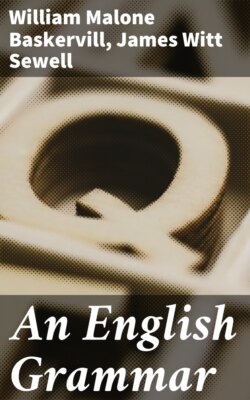Читать книгу An English Grammar - James Witt Sewell - Страница 28
На сайте Литреса книга снята с продажи.
ОглавлениеThe blind old man of Scio's rocky isle.—Byron.
Beside a pumice isle in Baiæ's bay.—Shelley.
In these sentences the phrases are equivalent to of the rocky isle [of] Scio, and in the bay [of] Baiæ, the possessive being really equivalent here to an appositional objective. It is a poetic expression, the equivalent phrase being used in prose.
(2) Objective possessive, as shown in the sentences—
Ann Turner had taught her the secret before this last good lady had been hanged for Sir Thomas Overbury's murder.—Hawthorne.
He passes to-day in building an air castle for to-morrow, or in writing yesterday's elegy.—Thackeray
In these the possessives are equivalent to an objective after a verbal expression: as, for murdering Sir Thomas Overbury; an elegy to commemorate yesterday. For this reason the use of the possessive here is called objective.
(3) Subjective possessive, the most common of all; as—
The unwearied sun, from day to day,
Does his Creator's power display.
—Addison.
If this were expanded into the power which his Creator possesses, the word Creator would be the subject of the verb: hence it is called a subjective possessive.
61. This last-named possessive expresses a variety of relations. Possession in some sense is the most common. The kind of relation may usually be found by expanding the possessive into an equivalent phrase: for example, "Winter's rude tempests are gathering now" (i.e., tempests that winter is likely to have); "His beard was of several days' growth" (i.e., growth which several days had developed); "The forest's leaping panther shall yield his spotted hide" (i.e., the panther which the forest hides); "Whoso sheddeth man's blood" (blood that man possesses).
How the possessive is formed.
62. As said before (Sec. 56), there are only two case forms. One is the simple form of a word, expressing the relations of nominative and objective; the other is formed by adding 's to the simple form, making the possessive singular. To form the possessive plural, only the apostrophe is added if the plural nominative ends in -s; the 's is added if the plural nominative does not end in -s.
